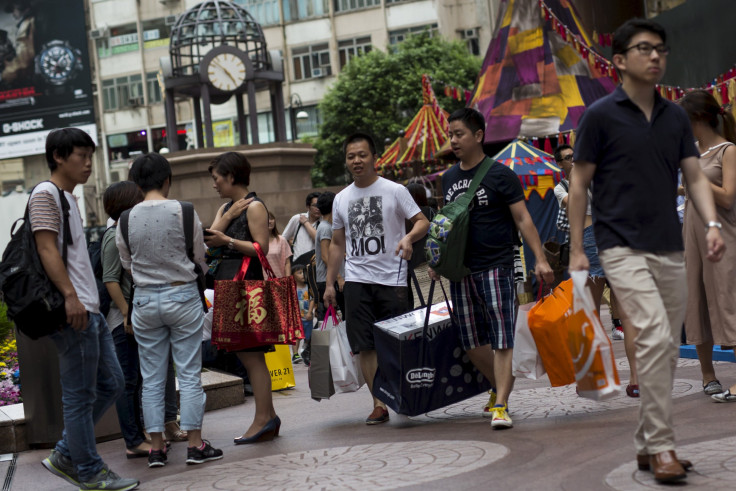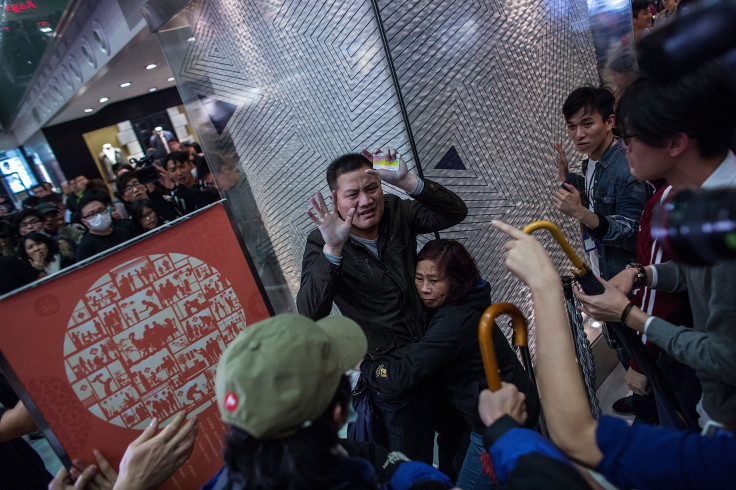Chinese Tourists Shopping At Hong Kong's 'Golden Week' In Reduced Numbers

During previous Golden Weeks, busy Hongkongers would tut disapproval as their shins were clipped by one of the scores of wheelie suitcases commonly pulled by visiting mainland Chinese tourists through busy shopping areas, or when they were forced to walk on the road by a queue of thousands of visiting mainlanders queuing up for some seemingly unmissable bargain that the locals disdained. This year, things seem to have changed.
Golden Week, which happens twice a year, around Chinese New Year and China's National Day, is normally a bonanza for Hong Kong retailers. Depending on how the weekends fall, workers can use three vacation days and get a continuous break of around 10 days, prompting millions of Chinese to make visits home, or to take a vacation, and a huge number of mainland Chinese have traditionally headed to Hong Kong, to visit the city's amusement parks, eat in restaurants and above all, to shop.
This year's Golden Week started Thursday, and Hong Kong retailers are already worried.
"I just made a few thousand (Hong Kong) dollars of sales this morning. It is a 70 percent slump. Worse still, it has just started," Yeung, a pharmacy owner in the city, told the South China Morning Post.
Whether sales can pick up over the rest of the week remains to be seen, but some of the factors at play that are pushing visiting mainland Chinese away from Hong Kong and toward other Asian destinations will not be easy to fix.
Tourism in Hong Kong has slumped this year, for the first time since 2009. The number of mainland visitors plunged 9.8 percent year-on-year to about 3.85 million in July, and 6.6 percent in August, according to the most recent available data from the Hong Kong tourism board.
"The passion of mainland travelers (for Hong Kong) has dampened dramatically this year," Sarah Leung, director of the Hong Kong Tourism Industry Employees General Union, told the China News Service.
She said the number of tour groups from the mainland during Golden Week will drop an estimated 10 percent compared with the same period last year.
The fact of the drop is all the more remarkable as, until recently, there were widespread calls in Hong Kong to limit the number of visitors from the mainland.
Such calls may be, in part at least, responsible for the drop. Hong Kong, a British colony until 1997, which today still enjoys greater freedom than its compatriots on the mainland, and to an extent, its citizens feel a degree of cultural superiority of them also. In the past two years, a series of incidents involving misbehavior by visiting mainlanders have sparked angry protests in the city, and stoked tensions between Hongkongers and mainlanders.
As well as cultural clashes, Hong Kong has seen protests and anger over so-called parallel trading, where mainlanders buy up large quantities of goods in Hong Kong and bring them over the border to be sold at a profit. In addition, mainland anger at last year's pro-democracy protests may also act to keep visitors away.

China’s state-controlled press blames anti-mainland sentiment in Hong Kong for Chinese going elsewhere. Xinhua News Agency quoted Song Xiaomeng, a Shanghai teacher, in a recent story saying that “lingering anti-mainland sentiment” was why she was choosing not to visit the territory.
In addition, the strength of the Hong Kong dollar relative to many other Asian currencies, in particular the weak Japanese yen, is pushing Chinese travelers to other destinations.
According to a list compiled by several travel agencies in Shanghai this year, long-dominant Hong Kong has slipped behind Thailand, Japan and Korea in the race to attract Golden Week shoppers.
Further falls in the number of shoppers, particularly those inclined to patronize Hong Kong's numerous luxury boutiques, is likely to inflict economic pain on elements of the retail sector, which has already seen sharp drops over the summer in the amount of spending on luxury goods.
© Copyright IBTimes 2024. All rights reserved.





















